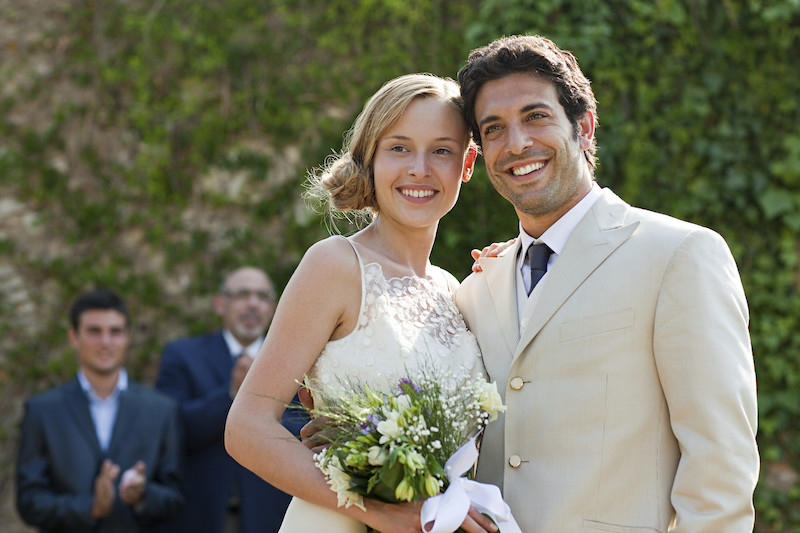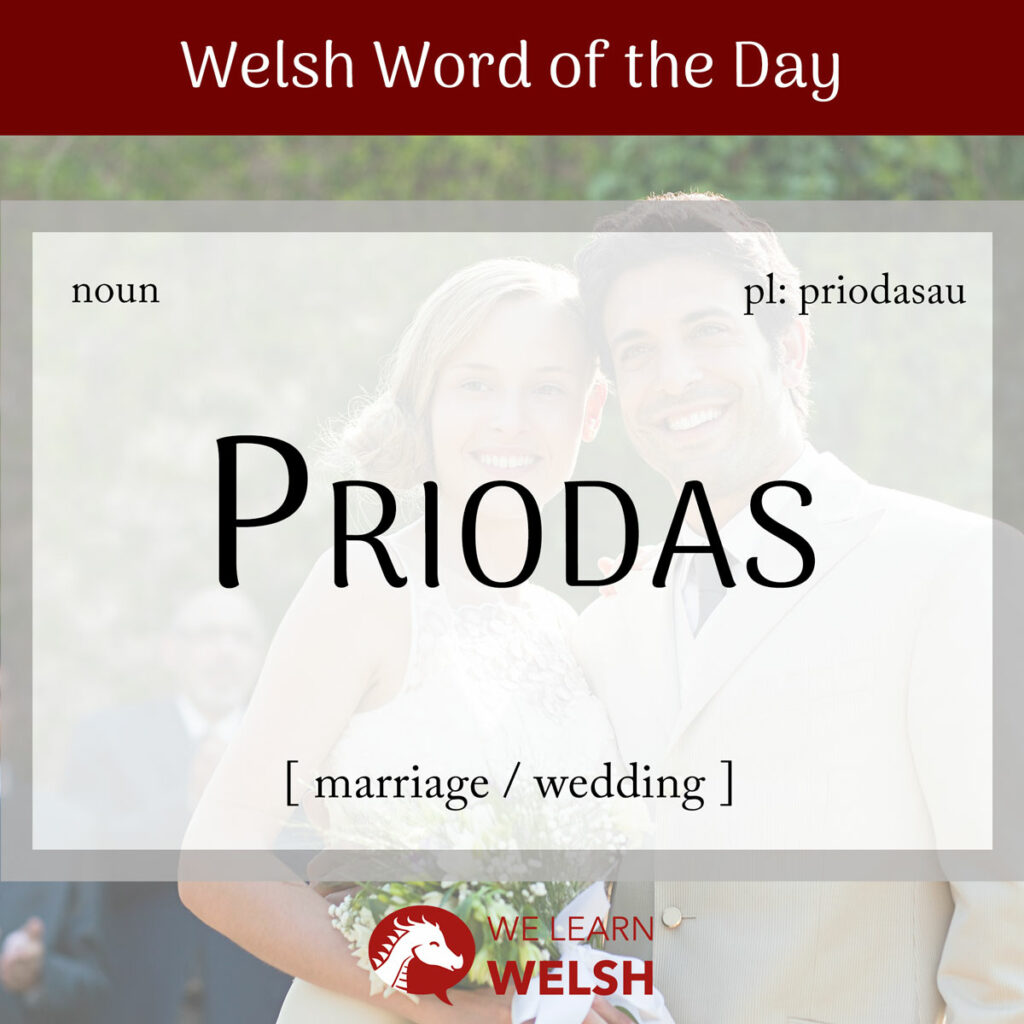Did you know that in Welsh, there is just one for word for marriage as a concept, a marriage, and a wedding? The word in question is priodas, and marriages or weddings is priodasau.
priodas
marriage / wedding
priodasau
marriages / weddings
I don’t know of any common synonyms for priodas in either sense – so when someone uses the word, you’ll need to figure out which meaning they’re going for from context.
The root of priodas is priod, a word meaning spouse as a noun or married as an adjective. Interestingly, priod’s origin, through Latin, is in the word privatus, which is also the root of preifat in Welsh and private in English. This seems to define marriage as a relationship being set apart from y wladwriaeth (the state) and y gymdeithas (society) – by becoming priod (married), one also becomes preifat.
It’s probable, for this reason, that priodas was used to mean a marriage before it also included a wedding. And indeed, the earliest recorded uses of priodas do refer to marriage.
Priod is also the ancestor of priodi (to marry). If you want to say to marry someone, you can either just put the word priodi in front of their name, or you can add the word â (with) in-between.
Priodas is a feminine noun. Here is how it mutates:
Soft mutation
briodas
Nasal mutation
mhriodas
Aspirate mutation
phriodas
And all three mutations are worth remembering, as all three are possible in standard speech. For example, his marriage is ei briodas, at Josie’s wedding is ym mhriodas Josie, and love and marriage is cariad a phriodas.
We often think of priodas as involving a priodferch (bride, literally married-daughter) and priodfab (groom, literally married-son) who become gwraig (wife, also woman) and gŵr (husband, also man). Though of course priodas gyfunryw (same-sex marriage) is becoming more and more common and accepted.
Dw i isio rhosys ar gyfer ein penblwydd priodas.
I want roses for our wedding anniversary.
Traddodiadau (traditions) around priodasau vary by country and culture. In the UK, stereotypically, a priodas takes place in an eglwys (church). The priodferch wears a ffrog wen (white dress) and modrwyau (rings) are exchanged as an addewid (promise) of commitment. The priodferch is attended by morwynion priodas (bridesmaids, literally wedding maids), and the priodfab by a gwas priodas (best man, literally wedding servant).
The seremoni (ceremony) is usually followed by a derbyniad (reception) with bwyd (food), dawnsio (dancing), and a teisen briodas (wedding cake). In Welsh this was traditionally called a neithior.
Then, if y pâr ifanc (the newlyweds, literally the young pair) are lucky, it’s all followed by a mis mêl (honeymoon)!
Maen nhw’n mynd i rannu popeth ar ôl y briodas.
They’re going to share everything after the wedding.

There are also traddodiadau relating to the celebration of penblwyddi priodas (wedding anniversaries), for example:
- priodas arian (silver wedding anniversary), celebrated on the 25th year
- priodas ruddem (ruby wedding anniversary), celebrated on the 40th year
- priodas aur (gold wedding anniversary), celebrated on the 50th year
- priodas ddiemwnt (diamond wedding anniversary), celebrated on the 60th year
- priodas blatinwm (platinum wedding anniversary), celebrated on the 70th year
Drwy gydol mis Mehefin, roeddwn i’n canolbwyntio ar gynllunio’r briodas.
Throughout June, I was concentrating on planning the wedding.
One famous priodas-related traddodiad specific to Wales is that of the llwy garu (lovespoon). A llwy garu is an intricately carved llwy (spoon) made of pren (wood), decorated with symbols that represent cariad (love), lwc (luck), and cred (faith).
In Wales historically, a llwy garu would be given by a young man to the woman he was courting. The difficult cerfio (carving) required was supposed to prove his worthiness as a potential gŵr. As such, they were a form of dyweddïad (engagement).
And in pre-Christian Wales, priodasau would have been conducted entirely differently, probably usually using the Celtic seremoni of hand-fasting. In this traddodiad (tradition) the couple’s hands are bound together with llinyn (string), rhubanau (ribbons) or a cylchyn pren (wooden hoop).
Teimlais i mor hapus ar ddydd fy mhriodas.
I felt so happy on my wedding day.
Let’s finish by looking at the Welsh translations of some important phrases related to dyweddïad and priodas.
- wnei di fy mhriodi i? = will you marry me?
- (ry)dyn ni wedi dyweddïo = we are engaged
- (ry)dyn ni’n cynllunio ein priodas = we’re planning our wedding
- hyd oni wahaner ni gan angau = til death do us part
- dyma fy adduned i ti = this is my vow to you
- rwy’n eich datgan nawr yn briod = I now pronounce you married
- dymunwn ni briodas ddedwydd i chi = we wish you a blessed marriage
Pob lwc (good luck) and llongyfarchiadau (congratulations) to anyone making use of these in the near future!

